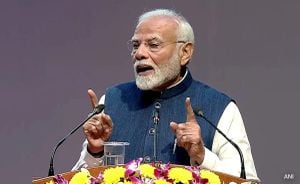The UK is stepping up its defense capabilities with bold new plans aimed at fostering rapid innovation, as articulated by Defence Secretary John Healey during the announcement of the country's latest industrial strategy. Amid rising global tensions and the lessons learned from the war in Ukraine, Healey emphasized the dire need for the UK to innovate at what he described as "wartime pace." This initiative marks the first time the UK will incorporate industry players directly during military war game exercises, highlighting the government’s commitment to collaborating with the private sector to bolster national security.
Speaking from the grounds of the Honourable Artillery Company, where he was inspecting drone technology, Healey pointed out the importance of preparing the military to adapt swiftly to new challenges. He stated, "We need together – government and industry – to be capable of innovation at a wartime pace," which speaks to the urgency of integrating more advanced technology within military operations.
War gaming, typically associated with military simulations and strategic planning, will help identify weaknesses and test responses to scenarios, such as prolonged conflicts disrupting supply chains. The Defence Secretary confirmed, “The war games will test how the military and industry deal with scenarios such as conflict where protracted fighting disrupts supply chains and processes.” This proactive approach aims to address the rapid pace of technological advancements on the battlefield.
When asked about the readiness of the British armed forces, Healey acknowledged, “What I’m doing is recognizing our forces need to be improved and equipped with what is necessary.” He underscored the need for British defense industry partners to keep pace with the increasing demands placed on them, stating, “Behind them needs to be an industry able to produce and innovate quickly under wartime pressures.”
A stark reminder of this urgency is the brief obsolescence cycles observed during the war with Russia, where battlefield technology became outdated within just six weeks. Healey outlined the objective of the new strategy, which aims to orient British defense investments toward UK-based businesses. This shift not only stimulates local economies but also promotes job creation, aligning national security objectives with economic growth.
Recent developments reflect this strategic pivot. Defence AI company Helsing has announced plans for mass production of its HX-2 drone, part of a significant £350 million investment over five years aimed at enhancing the UK’s technological capabilities. This drone, powered by artificial intelligence, is capable of identifying potential targets autonomously but still relies on human operators to confirm strikes. Such advancements will potentially transform UK operations and response mechanisms.
Other major players in the defense sector have also stepped up their recruitment efforts. BAE Systems and Babcock have pledged to hire thousands over the next year, including new graduates and apprentices, indicating a push for fresh talent and innovation within the defense domain. Healey's remarks come at a time when the government is considering its future defense spending strategy, which aims at increasing the budget to 2.5% of GDP. While specific timelines are still under discussion, there is considerable pressure to outline clear steps for achieving this goal.
Healey’s approach signals not only the urgency surrounding defense innovation but also the recognition of the private sector's role as fundamental to military success moving forward. The aim is ambitious: to create an agile, responsive defense infrastructure capable of meeting the challenges posed by 21st-century conflicts. This strategy, which promises to reshape how the UK military interacts with technology and industry, may very well be the edge needed as global dynamics continue to evolve.
By integrating defense innovation through industry collaboration and enhancing local production capabilities, the UK is positioning itself to not only respond effectively to current threats but also to stay one step ahead. It’s clear the message is not just about preparedness; it’s about revolutionizing the approach to national security. The time for change is now, and as the UK looks to bolster its defenses, the spotlight is firmly on innovation and collaboration as the twin engines driving future success.



